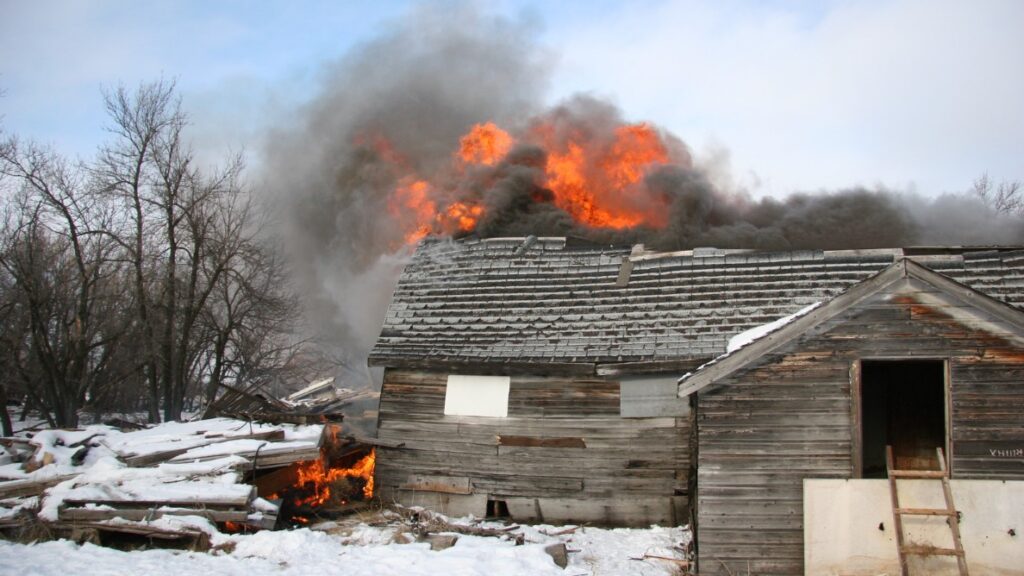Key Points:
- Heating equipment is a leading cause of winter fires, but safety practices can reduce risks.
- Regular maintenance and inspection of heating systems are crucial to preventing fires.
- A public adjuster can help you navigate winter fire-related damage claims.
Winter fires are a significant concern when temperatures drop, with heating equipment being a major culprit. Whether it’s a space heater, a furnace, or a fireplace, these devices can pose dangers if not maintained or used correctly. The good news is that with proper precautions and proactive measures, the risks associated with heating equipment and winter fires can be significantly reduced.
What Causes Winter Fires?
Winter fires typically result from malfunctioning or improperly used heating equipment. But the sources are wide-ranging. The most common causes include:
- Overloaded circuits from electric space heaters or extension cords.
- Poorly maintained furnaces or chimneys that don’t get the necessary cleaning or inspection.
- Faulty wiring in older appliances or systems.
- Improperly used flammable materials near heating devices.
- Unattended space heaters and fireplaces.
These are just a few reasons why winter fires become more prevalent as colder temperatures drive up heating demands. It’s critical for homeowners to understand how their heating equipment works and the precautions necessary to ensure safety throughout the season.

How Can You Prevent Winter Fires?
Preventing a winter fire begins with a comprehensive understanding of the equipment and systems within your home. Below are some essential tips to minimize the risks of heating equipment and winter fire hazards:
1. Perform Regular Inspections and Maintenance
It’s important to keep your heating systems well-maintained, especially as the cold months approach. Schedule annual inspections for furnaces, chimneys, and other heating appliances. A certified technician can detect and fix potential issues such as faulty wiring or buildup of flammable materials.
Chimneys, for instance, should be cleaned every year to prevent dangerous creosote buildup, which is a major fire hazard. Furnace filters should also be replaced regularly to avoid overheating and to ensure the system works efficiently.
2. Proper Usage of Space Heaters
Space heaters are among the leading causes of winter fires. If not used properly, they can quickly overheat and fire neighboring furniture or clothes. Keep these heating devices no closer than three feet away from any flammable materials, such as drapes, furniture, or blankets. Never leave a space heater idle, and always switch it off prior to leaving the space or going to bed.
Also, make sure to plug space heaters directly into an outlet rather than using extension cords or power strips. Overloading circuits can lead to overheating and pose significant fire risks.
3. Install Smoke Detectors and Fire Extinguishers
This safety step is critical and often overlooked. Having a working smoke detector on each level of your home, especially near bedrooms, can alert you in case of a fire. Check that detectors are working and replace batteries at least once a year.
In addition, have a fire extinguisher handy near your kitchen or heating areas. Learn how to use it properly, as prompt action can often minimize the damage caused by a winter fire.
What Are the Signs Your Heating System May Be Faulty?
Sometimes heating equipment can malfunction without obvious warning signs, which is why regular maintenance is important. However, there are some telltale signs that may indicate your heating system is at risk of causing a fire:
- Strange smells or sounds – If you notice a burning smell or any unusual sounds coming from your furnace or heater, it may signal an issue with the unit. This could indicate overheating, frayed wires, or other problems that could lead to a fire.
- Inconsistent heating – If your heater is not warming your home as effectively as before, it could indicate malfunctioning parts or a system failure. A faulty heating system can overheat or malfunction in ways that lead to dangerous situations.
- Excessive dust buildup – When a furnace or heating system is not properly maintained, dust and debris can accumulate and create a fire hazard. Make sure filters are changed, and vents are cleaned regularly.
- Hot surfaces – If you feel that surfaces around the heater are abnormally hot, this could signal that the unit is overheating. Overheated surfaces increase the chances of ignition, especially if flammable materials are close by.
Regular maintenance checks can help catch these issues early, ensuring that your heating system operates safely during the winter months.
What Are the Financial Risks of Winter Fires?
When a winter fire occurs, it’s not just the property that is at risk. The financial impact can be devastating, especially if the fire severely damages your home or possessions. In these instances, homeowners insurance can help mitigate the costs, but navigating claims can be complex.
Winter fires can cause:
- Significant damage to property – If the fire spreads, it can damage structural elements of your home, as well as valuable personal property.
- Additional living expenses – If your home is rendered uninhabitable due to fire damage, you may need to stay in temporary accommodations, leading to unexpected expenses.
- Repair costs – After a winter fire, repairing heating systems, wiring, and other infrastructure can be costly.
Having an understanding of your insurance policy and knowing how to file claims can make a huge difference. In some cases, homeowners may struggle to receive the compensation they deserve, especially if they miss crucial details in the claims process.
How Can a Public Adjuster Help After a Winter Fire?
If your home has been affected by a winter fire caused by heating equipment, a public adjuster can help you navigate the often complicated insurance claims process. Public adjusters work on behalf of the policyholder, ensuring that you get the fair settlement you deserve.
- Thorough damage assessment – A public adjuster can perform a detailed evaluation of the damage caused by the fire, identifying all affected areas that need to be repaired or replaced.
- Efficient claims handling – Public adjusters are experienced in negotiating with insurance companies, ensuring that your claim is processed swiftly and fairly.
- Advocacy on your behalf – With a public adjuster by your side, you have an expert who understands the claims process and can work to ensure that your insurance company treats you fairly.
For policyholders in New York, New Jersey, and Florida, Crestview’s team of public adjusters is ready to assist with winter fire-related claims. We ensure that you are fully compensated for the damage caused by your heating equipment, helping you recover as quickly as possible.

Take Action and Protect Your Winter Fire Claims
If you’ve experienced damage from a winter fire caused by heating equipment, don’t navigate the insurance claims process alone. Crestview, a trusted public adjuster in New York, New Jersey, and Florida, is here to advocate for you.
With our experience in handling fire damage claims, we ensure that you receive the compensation you deserve, allowing you to focus on rebuilding your home. Reach out today for a free consultation, and let us help you recover from your winter fire claim with confidence.
Contact Crestview now for a free consultation and ensure that your winter fire claim is handled with the expertise you deserve!

